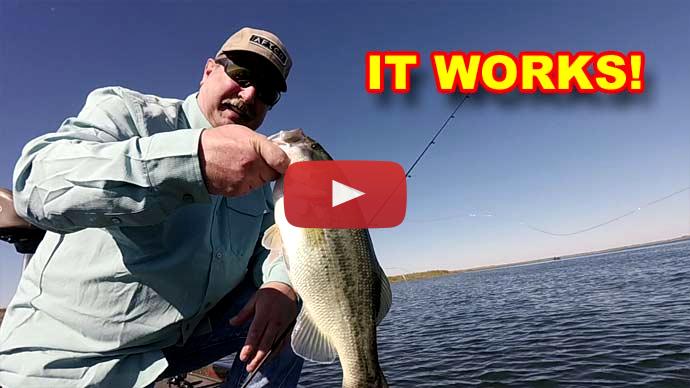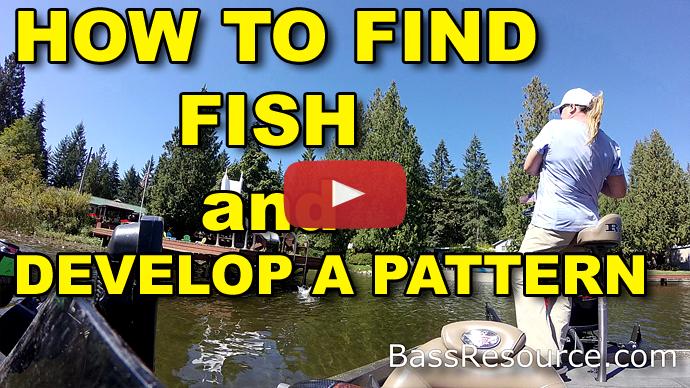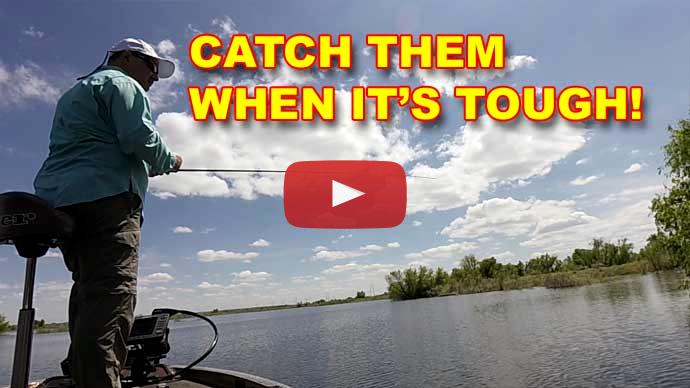You know, if you've been bass fishing for any amount of time, at some point, you get into a fishing slump. I mean, it happens to all of us. We've all done it. We've all been there before. And it can seem like you're out there fishing and everybody else is catching fish except for you. You come into the ramp, you come into the weigh-in, whatever it is, you talk to your buddies, and they're like, "Oh, man, I slayed them today," or, "I caught a bunch of fours and fives," and blah, blah, blah. And you caught maybe a few dinks, if that at all. And it keeps happening. If you find yourself in this situation, here are five ways to get yourself out of a fishing slump. Starting with go back to basics.
Yeah, you know, we get into this rhythm sometimes of buying the latest and greatest lures and gear. We want to be the first on the lake to try this brand-new lure, and, hopefully, the bass have never seen it yet because you're the first one on the water to have it. And sometimes that works. Sometimes you end up catching a bunch of bass on a brand-new lure that, you know, they haven't been accustomed to yet. Fine. But the reality is when you're in a slump, it's often best to get back to the basics. Get back to what you used to throw all the time, your confidence lures, the stuff you used back when you first started fishing. These are the things that you caught....it didn't necessarily mean size, it could just be numbers of fish, but it could be a spinnerbait, crankbait, it's a plastic worm or tube or some creature bait, something that you used to fish all the time and you caught a lot of fish on. Going back to that does a couple things. First of all, you start catching fish because you know how to fish it. And that helps gain your confidence, but also it kind of brings you back into your grassroots. It kind of centers you again back to how fishing used to be. And instead of all these tangents that you may have gone on trying different types of fishing, different techniques, it centers you back to your style of fishing that works best for you. And so that often works.
Plus, a lot of times you dig out old lures that maybe aren't made anymore. And it's something that the fish out in the lake nowadays haven't seen yet. So sometimes going old school on them is new school. You end up catching a lot of fish on baits that were made back in the '70s, '80s, '90s, what have you, that you just can't find anymore. And that can be a really effective way of getting out there and catching a lot more fish. Another way of getting back to basics is go back and visit where you used to fish. Right, that may be a lake or a pond or a stream or a river, some place where you used to fish all the time and you used to catch a lot of fish. Sometimes revisiting those locations, it brings back fond memories. There's a lot of things like, "Oh, yeah, I forgot about that, and I forgot about that." It's kind of fun to go back and reminisce. And you also sometimes catch a lot of fish too. Again, may not be big fish, but just getting back into the rhythm of catching fish, recentering your grassroots and getting back to what made you fall in love with bass fishing. Sometimes that's all it takes to get out of a slump.
But let's move on. Another tip is to get away from social media, right? I mean, social media has its place. You can keep up on trends, you can keep up on what's going on in the fishing community and with your friends and with pros and everything else you're interested in with fishing. However, no one's going to post on social media their mediocre catches or if they didn't do so well in a tournament. So what you end up seeing on Facebook and Instagram and other channels is pictures of people with big fish or lots of fish or they won a tournament. And it seems again like everybody's out there succeeding but you. And it can be pretty tough on your confidence, right? So just get away from social media for a while and just compare yourself to you and where you're at. Go out and maybe try a new technique or a new lure, but go out there and try to gauge your progress against yourself. That is really the only thing that matters anyway. Maybe it's trying a new technique or learning something on your depthfinder. Or maybe it's just catching some fish again on some older lures like I just mentioned. But that's progress compared to you. And looking at social media sometimes is a pipe dream, and it can really deflate your ego. So just get away from it for a while, not forever, but just maybe it's time to walk away from that for a little bit. Just focus on you and focus on your fishing.
Another method to try is to go out and fish for other species. Many of us, and myself included, that got into bass fishing were actually fishing for other species before they fished for bass. And sometimes going back to that just brings back your passion for fishing. It could be fishing for bream, bluegill, perch, trout, salmon, walleye, whatever it may be that you used to fish for before. Maybe just going back to that for a while brings back those memories, gets a little nostalgic, and you start catching fish again, especially like perch and bream. And they'll attack sometimes a hairpin, doesn't matter what you throw out there. Even though you're not catching big fish, you're catching a lot of fish. And that can help build confidence. It's just flat-out fun too, right? I mean, if you're catching them every other cast, and maybe they're just a bunch of little fish, but what the heck? It's keeping you occupied. It's better than going out and cutting the lawn, right? I mean, let's face it, fishing is fun. And just going back to fishing for these different species is sometimes all it takes.
Another tactic is to maybe go out and do some saltwater fishing. Or maybe that's what you used to do. But if you have access and you're able to go, go saltwater fishing. And you don't necessarily need a boat to do that. You can fish from a pier or a dock. There's a lot of opportunities for that. Now, squid jigging, for example, is very popular off of piers. But you can do like what I did when I was a kid. My buddy and I used to ride our bikes down there to the marina. And we'd get there at the gas dock. And we'd take just bare treble hooks. And we'd wait for the tide to get down. And we'd pick off barnacles off the pilings and stick them on our treble hooks. And then we'd just kick a bunch of barnacles off the pilings and then toss our barnacle-laden treble hook right down with it and let it float down with them. And sure enough, we'd get bit almost every time. A lot of times it was flounder. We didn't really care. We didn't care what we were catching or the size of it. It was just fun to catch fish that way. And sometimes just doing something a little bit different just reinvigorates your passion for fishing and gets you back in the groove again.
Another way that you can get out a fishing slump is to take someone fishing, right? Now, that actually might sound a little counterintuitive, right? Like, oh, my gosh, I'm not catching any fish. I'm not doing very well. Why would I want to take somebody else and bring them along for the torture? No, that's not what I'm talking about. Say you bring a kid or teenager along, even an adult that hasn't really been fishing, and they get out there, and they start to see things that you've ended up taking for granted, right? The sunrise on the water, the sounds of the birds, seeing a deer on the lakeside on the shore, maybe the cattle or other wildlife, the birds, an eagle, things like you're like, "Oh, wow, that's kind of cool," but you've actually got accustomed to it. It doesn't really strike you like it used to. You see it through their eyes. It's the first time that they see it and the excitement that they get. You know, and even just catching a little fish. I had a kid with me once, and we went fishing, and he hooked onto a decent-sized smallie. It wasn't very big. It was like a pound and a half smallie. And he got it up to the boat, and it got loose. He lost the fish right at the boat. And here I was getting ready to console him, "Oh, I'm sorry you lost the fish," blah, blah, blah. Instead, the kid turned to me and goes, "Did you see that? Wasn't that cool? That was so awesome. That was so much fun. Let's do it again," right? I was like, "Yeah." You know, sometimes it doesn't matter the size of the fish or even getting them in the boat. It's just catching them and feeling them tug at the end of your line.
You know, I had forgotten about that, and I learned from him that day. And that's the kind of thing I'm talking about. Also, when you take someone out fishing, say an adult who hasn't been fishing much, they might ask a lot of questions, a lot of beginner, sometimes fundamental questions, and you start answering. It makes you think. It makes you think about the fundamentals and think about some of the stuff that maybe some bad habits you formed or maybe there's some things that you shied away from, you've kind of gotten away from doing, and you need to get back to it. And just by teaching somebody else how to fish, I can tell you, my girlfriend, now wife, when I got her into bass fishing, she had only been salmon fishing before and a lot of it, but hadn't done any freshwater fishing. So to teach her bass fishing, she had a lot of questions, and sometimes it was stump the band time. She'd ask some questions I hadn't thought of before, and I had to think about it. And it actually made me a better angler. Thinking through the details more intuitively and explaining it to somebody, the whys and hows and whats, makes you a better angler because now you're thinking more on the water and not overthinking it. It's just beginning to get back to the fundamentals and understanding what's going on with the fish and what's going to get them to bite.
And then, finally, one more tip to get you out of a fishing slump is sometimes you just got to fish your way out of it. Now, before you call BS on me, I'm not saying just go out and fish and rub some dirt in it and go do it. No, no, no. Look, if you do all the things I just mentioned and then you apply them when you go on the water, like trying out the old lures you used to throw, trying old places that you used to go to, those things can really help rebuild your confidence as you slowly get back in the groove. Plus, a couple things you can do by going out fishing, for example, try a new body of water. Go to a new lake, a new river, a new stream, something that you've never tried before, and go out there and explore. Just doing that makes you look at your graph more often, makes you figure out like, "What lure should I be throwing?" And you might stumble across some rock piles or some weed edges or what have you, and just finding that stuff sometimes is really fun. You may not catch a lot of fish, if any at all, but you've learned a lot that day about a new body of water. And if you can't go to a new body of water, then maybe explore new areas or areas you haven't visited in a long time on your existing body of water. I did that this summer, not because I was in a slump, but I was getting kind of tired and bored of fishing the same places and fishing the same old same old.
So I did two things. One, I went back to a place that I fished decades ago and had success at, but I hadn't been to it in a long, long time in lieu of other places that were better, right? So I went back to that area this year, and lo and behold, yep, there were fish there and some good ones. And it may have been an under-fished area, I don't know. I don't keep tabs on everything, but it seemed like those fish were really eager to bite. And I fished that area a lot this summer and into the fall and caught quite a bit of fish. Another thing is I went to a brand-new area on this, like, I'd never fished for, especially when the water levels are down. I'd never fished that area before, but I went in there, kicked on my graphs and my maps and looked at some areas, and I found, like, a little underwater point that jetted out quite a ways and had deep water on each end, at least according to the map. And I crept my way on up there, and within a couple of casts, boom, I was catching fish. Now, that's where maps study really works. I have never ever fished this spot in my entire life. I just looked at the map, and I thought, "You know what, it looks pretty good." Couple casts into it, boom. Nice quality keeper fish. How do you like that? I mean, how exciting is that? Like, an area you've never fished before, but you've put what you've learned before on other bodies of water, and you go there, and, boom, you start catching fish. That is one heck of a way to build your confidence up and just your ability to find fish and figure out what's gonna get them to bite.
So doing those things, all those things I just mentioned, hopefully, will help you get out of a slump and get you back on your feet and catching fish again. Hope that helps. For more tips and tricks like this, visit bassresource.com.



